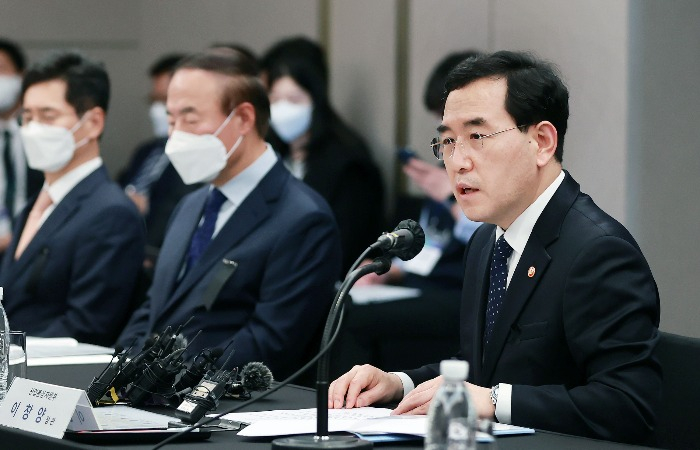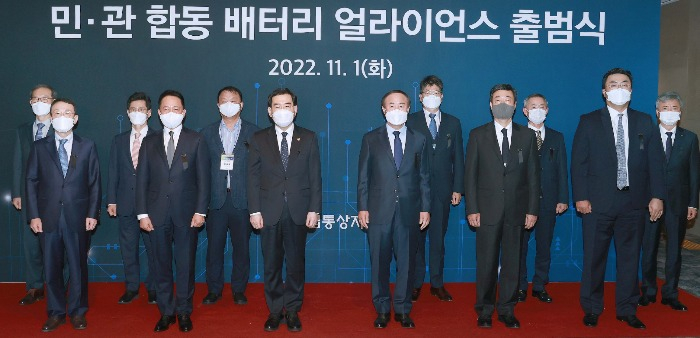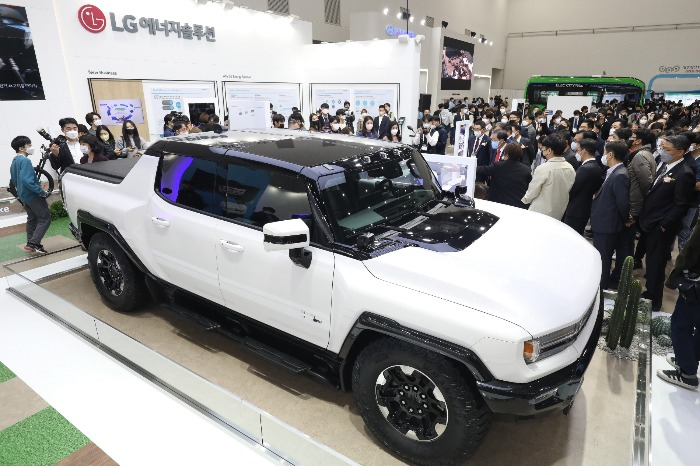Public-private battery alliance launched to source critical minerals
The S.Korean battery alliance will invest $35 billion over the next eight years in the domestic renewable battery ecosystem
By Nov 02, 2022 (Gmt+09:00)
LG Chem to sell water filter business to Glenwood PE for $692 million


Kyobo Life poised to buy Japan’s SBI Group-owned savings bank


KT&G eyes overseas M&A after rejecting activist fund's offer


StockX in merger talks with Naver’s online reseller Kream


Mirae Asset to be named Korea Post’s core real estate fund operator



The South Korean government, in tandem with the private sector, launched a battery alliance on Tuesday in a bid to support the companies in sourcing the critical minerals used to manufacture rechargeable batteries.
Their aim is to reach a 40% global market share by 2030, surpassing China as the biggest player in the global renewable battery sector.
The alliance also unveiled plans to inject more than 50 trillion won ($35 billion) into the domestic industry.
INFLATION REDUCTION ACT OF 2022
Trade, Industry and Energy Minister Lee Chang-yang presided over the meeting attended by Samsung SDI President and CEO Choi Yoon-ho, SK On CEO Jee Dong-seob, President and Chief Risk Management Officer of LG Energy Solution Lee Bang-soo, and other industry leaders.
While presenting the government’s Renewable Battery Industry Innovation Strategy, Minister Lee said, “Even amid growing uncertainty with major economies reshuffling their supply chains to prioritize their own companies, the current crisis can serve as an opportunity for new growth.”
He elaborated that the first step is establishing a public-private alliance to secure key minerals for battery production.

Although local battery manufacturers have already been looking into investing in mines in Australia, Canada and Chile, industry insiders are concerned that the corporate sector’s efforts may not do enough to offset Washington's measures to bolster Corporate America.
On August 16, the US government passed the Inflation Reduction Act of 2022, which aims to curb inflation by reducing the deficit, lowering prescription drug prices, and investing in domestic energy production. Under the act, an electric vehicle made with minerals that were mined or processed in the United States qualifies for a tax credit of up to $7,500.
The alliance is set to pursue activities related to securing key minerals, such as mapping, furnishing financial support, and assisting the refining and smelting businesses.
In line with this effort, the Korea Trade Insurance Corp. and the Export-Import Bank of Korea have agreed to furnish 3 trillion won in loans and guarantees for five years.
TECHNOLOGY, MANUFACTURING & MANPOWER
Seoul plans to build a positive cycle of recycling and reusing batteries to deal with environmental regulations, particularly those set by the European Union.
The strategy stipulates that the alliance will inject 20.5 trillion won by 2030 for developing core technology. The amount includes 1 trillion won for government-led R&D and 19.5 trillion won for the private sector.
The goal is to commercialize the all-solid-state battery by 2026 and to secure the technology that allows cars to cover 800 km on a single charge.
The battery industry will pour 30.5 trillion won into facilities investment in Korea through 2030 to increase domestic battery output 1.5-fold, from 39 gigawatt hours last year to 60 gigawatt hours by 2025.
The alliance will also seek to bring an additional 16,000 employees into the sector by 2030 to meet the surging labor demand in the burgeoning industry.
To achieve this, it will establish an academy where the government will provide the infrastructure and the private sector will shape the curriculum.

REVVING UP FOR INVESTMENT
At this week's meeting, battery makers’ top managers unveiled their plans for continuous investment into and throughout 2023.
In a meeting with reporters the same day, Samsung SDI’s Choi said he is doing his best in terms of investment, which the press interpreted as an intent to make additional facilities investment.
Choi noted that the company plans to execute the investment based on the three pillars of the company's long-term management strategy: unmatched technological competitiveness, highest quality, and qualitative growth based on profitability.
As for how Samsung SDI will respond to the Inflation Reduction Act, Choi said it is too early to tell.
Meanwhile, commenting on POSCO Chemical's plant investment in Europe, President Min Kyung-zoon said: “We will decide on our strategy once the regulations are set in place. Funds will go where there is affordable electricity and clean energy.”
Write to Il-Gue Kim, Ji-Hoon Lee and Hyung-Kyu Kim at black0419@hankyung.com
Jee Abbey Lee edited this article.
-

-
 Pre-IPOsSamsung SDI supplier Jaewon seeks about $280 mn in pre-IPO
Pre-IPOsSamsung SDI supplier Jaewon seeks about $280 mn in pre-IPOOct 19, 2022 (Gmt+09:00)
2 Min read -
 Korean chipmakersSamsung Elec. celebrates world's first shipment of 3-nanometer chips
Korean chipmakersSamsung Elec. celebrates world's first shipment of 3-nanometer chipsJul 25, 2022 (Gmt+09:00)
3 Min read


